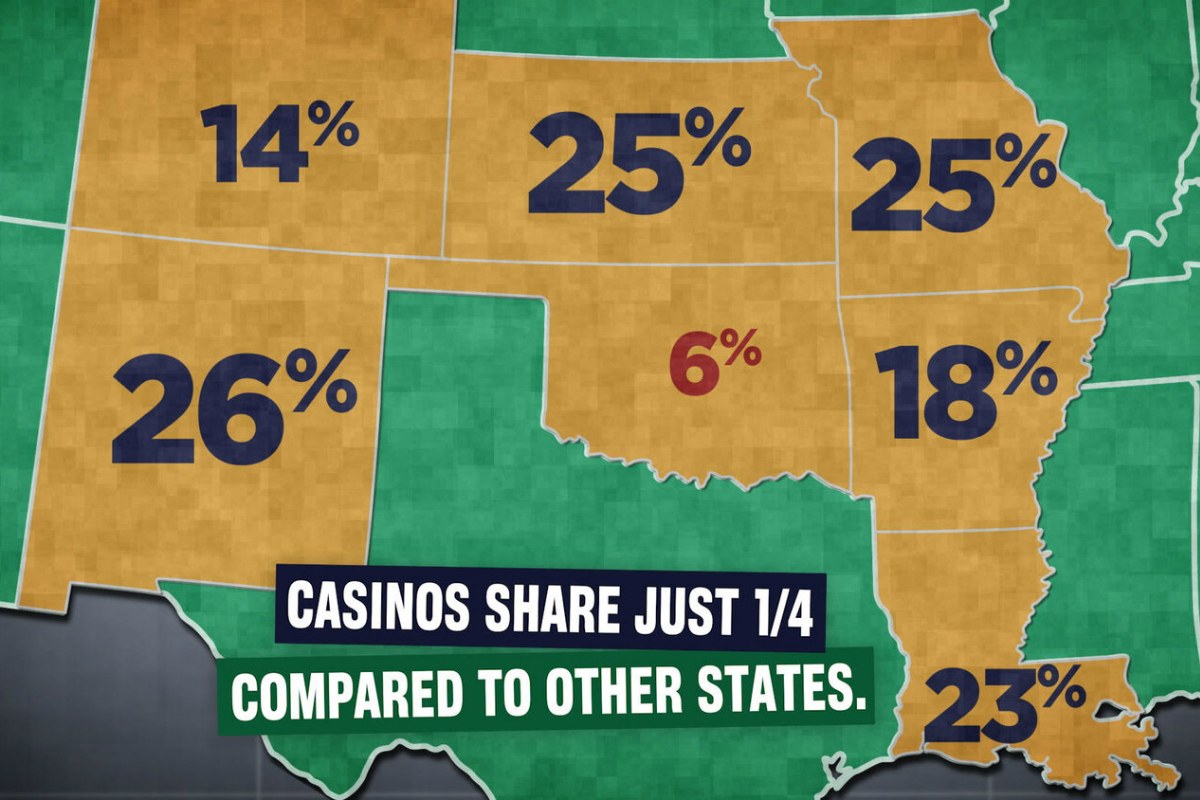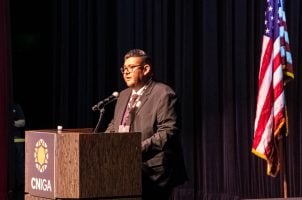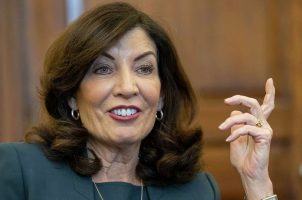Oklahoma Tribal Casino Opposition Deploys Ad Campaign Demanding More Gaming Revenue
Posted on: February 7, 2020, 09:55h.
Last updated on: February 7, 2020, 11:43h.
Oklahoma’s tribal casinos aren’t sharing enough of their gaming win with the state. So says a newly formed opposition group that has gone on the offensive with an advertising campaign blitz.

Gov. Kevin Stitt (R) is under the impression the Class III gaming compacts that allow more than 30 federally recognized tribes to operate slot machines and table games in the Sooner State expired January 1 after a 15-year run. The tribes contend the arrangements automatically renewed.
Stitt says the four to six percent tax on slot win and 10 percent on table games given to the state is far too low. A group called Oklahomans for Fairness agrees.
Oklahoma casinos share just one-fourth of what the surrounding states’ casinos share,” a 30-second commercial produced by the organization declares. “That’s not fair and it’s time for this to change. It’s time for the casinos to play fair.”
Oklahoma’s tribal casinos paid the state nearly $139 million last year. The money is predominantly used to fund public education.
Oklahomans for Fairness compares the state’s tribal gaming tax to commercial rates in neighboring states. The group points to commercial gaming taxes of 26 percent in New Mexico, 14 percent in Colorado, 25 percent in Kansas and Missouri, 18 percent in Arkansas, and 23 percent in Louisiana.
Opposition Supporters
Stitt faced backlash this week from the Oklahoma Legislature after he called on them to pass a bill that would allow him to use rainy day money to bridge the education funding gap as he continues his fight against the tribes.
The governor says he plans to reject gaming payments until the matter is resolved in court. Democratic lawmakers say Stitt should have realized his “unwinnable fight” would result in missing education funds.
The governor says he isn’t involved with Oklahomans for Fairness. Stitt spokesperson Baylee Lakey said, “We have no knowledge of these ads.” That isn’t to say, however, that the group isn’t backed by some powerful individuals.
Jonathan Small, president of the Oklahoma Council of Public Affairs, is president of Oklahomans for Fairness. The committee was incorporated by former US Sen. Tom Coburn (R).
Tribal Compact Rates
Stitt wants to renegotiate the tribes’ compacts, and has set a minimum tax at 20 percent for slot machines. How egregious of an increase that is depends on which state is compared. Several jurisdictions surrounding the Sooner State offer tribal gaming.
In Kansas, tribes don’t share a dime with the state. Instead, they only cover expenses incurred by the state in governing the tribal casinos. The same is true in Colorado and Wyoming, where compacts don’t mandate a revenue-sharing provision.
In New Mexico, tribal casinos share between 8.75 percent and 9.5 percent, depending on their gross gaming revenue (GGR). Arizona taxes Native American gaming win at a rate of 3.5-8 percent, and South Dakota nine percent. Michigan tribes share eight to 10 percent.
On the other end of the spectrum, in Connecticut, the state’s Mashantucket Pequot and Mohegan Indians direct 25 percent of their slot revenue to the government. Several New York tribes share 25 percent, too. In Florida, the Seminole Tribe has given the state $350 million annually. But that recently stopped as the tribe and state tries to settle a several years-long dispute.
Related News Articles
Most Popular
FTC: Casino Resort Fees Must Be Included in Upfront Hotel Rates
Genovese Capo Sentenced for Illegal Gambling on Long Island
NBA Referees Expose Sports Betting Abuse Following Steve Kerr Meltdown
UPDATE: Former Resorts World & MGM Grand Prez Loses Gaming License
Most Commented
-
UPDATE: Whiskey Pete’s Casino Near Las Vegas Closes
— December 20, 2024 — 31 Comments -
Caesars Virginia in Danville Now Accepting Hotel Room Reservations
— November 27, 2024 — 9 Comments -
UPDATE: Former Resorts World & MGM Grand Prez Loses Gaming License
— December 19, 2024 — 8 Comments -
FTC: Casino Resort Fees Must Be Included in Upfront Hotel Rates
— December 17, 2024 — 7 Comments
















Last Comments ( 5 )
This is a lie as far as Kansas is concerned. Here is the actual link. Look at the BOTTOM OF PAGE 3 UNDER where it SPECIFICALLY says: TRIBAL GAMING Revenue Share: The tribes do not share any revenue with the state. However, all operating expenses for the KSGA must be paid by tribes from a fund created in the state treasury called the Tribal Gaming Fund. State Use of Revenue: The tribes do not share any revenue with the state. Tribal Use of Revenue: Under the compacts, tribes must use their revenues for: • Funding tribal government operations or programs; • Providing for the general welfare of tribes and its members; • Promoting tribal economic development; • Donating to charitable organizations; Here's the link: https://www.americangaming.org/wp-content/uploads/2019/07/AGAGamingRegulatoryFactSheet_Kansas.pdf
Let’s apply this same formula to oil production tax. Alaska gets 15%, Texas has an effective rate of 10%. Oklahoma 5% up from 1-to 2 percentfrom 2009 after Fallon was elected. Oklahoma gets the least from the top 5 oil production states, costing Oklahoma billions since 2009. The reason for our budget collapse over the Fallon administration.
This has been my contention as well. They are higher because they have fewer tribes with fewer casinos. Oklahoma has more of both by far. 6% is good!
6% from over 100 casinos in oklahoma sounds fair. Probably more than 25% of 9 casinos.
After seeing this ad, I compared the number of casinos. I chose Kansas and see that the state of Kansas has 9 casinos. Missouri has 13 casinos. Oklahoma has over 100 casinos. This information was found on the internet. Instead of percentages, I believe the revenue should be compared. Is 25% of 9 casinos more or less than 6% revenue on over 100 casinos?